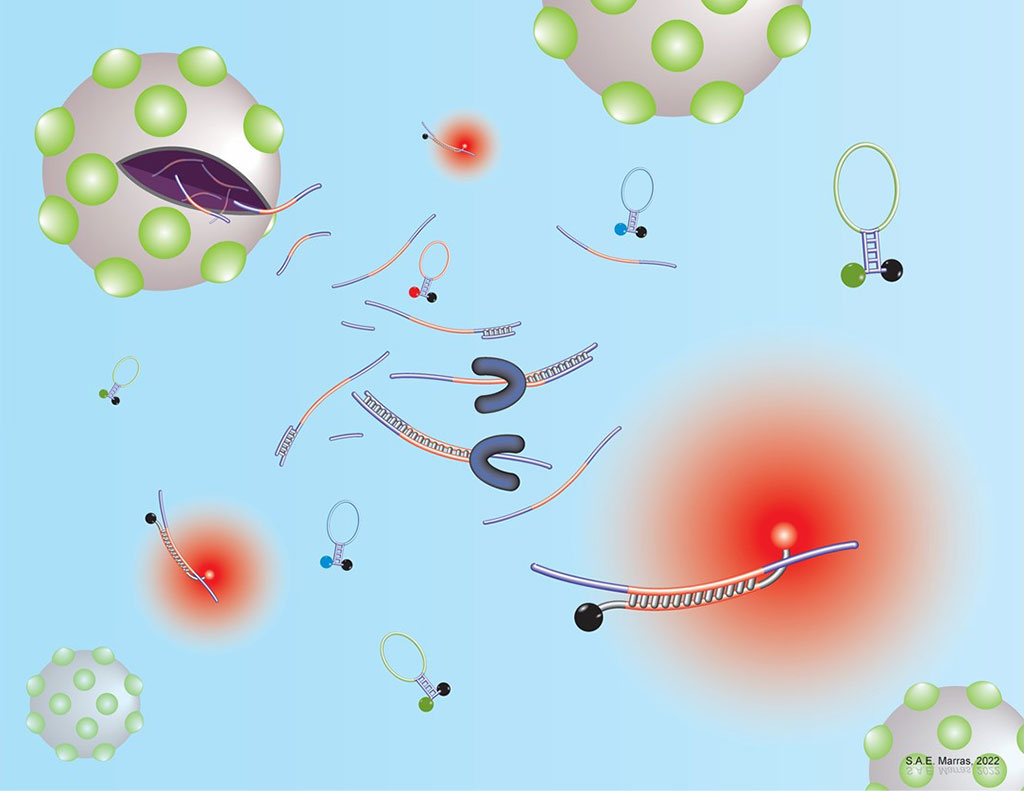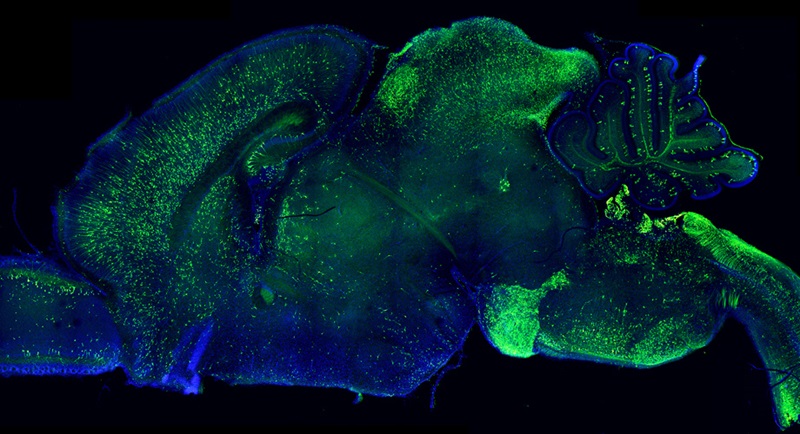New COVID-19 PCR Test Identifies All SARS-CoV-2 Variants in Positive Patient Sample
|
By LabMedica International staff writers Posted on 18 Mar 2022 |

Accurate and reliable COVID-19 testing needs to be accompanied by identification of specific SARS-CoV-2 variants strains that reveal important information such as the length of incubation period, length of contagious period, transmissibility, pathogenicity, and even changes in the predominant symptoms. The deep sequencing needed to identify SARS-CoV-2 strains is accurate and can identify each mutation present in a sample, but it is costly, slow and requires specialized equipment. Now, a new PCR test uses molecular beacons not only to diagnose COVID-19 infection, but also to identify the specific SARS-CoV-2 variant causing that infection. The methodology is openly available so that it can be replicated by any facility that can run a PCR test.
Using real-time PCR probes designed by Rutgers University (Newark, NJ, USA) and already used around the world for many purposes, researchers designed the Rutgers-RP RT-PCR assay to detect mutations in SARS-CoV-2 that have been shown to increase immune escape, avoid neutralization, and increase transmissibility. They pioneered the use of molecular beacons to identify specific genetic mutations. Molecular beacons are hairpin-shaped molecules that can be designed to selectively bind to a specific mutant sequence, avoiding wild-type sequences that often differ by a single nucleotide.
Nine mutations were selected for testing, and the beacon for each has differently colored dyes. Every original variant of concern – alpha, beta, gamma, delta, and omicron – has a unique combination of these mutations, and when the beacon binds to its target molecule, its distinct color can be detected by the assay. Each beacon was tested individually to confirm its specificity to the assigned mutation. Then, the beacons were combined into a multiplex assay and tested by RT-PCR on 26 SARS-CoV2–positive patient samples that had previously been tested and identified with deep sequencing. Two samples were identified as the alpha variant, two as the epsilon variant, and eight as the delta variant. The multiplex assay was in full agreement with results from deep sequencing, with a sensitivity and specificity of 100%.
Researchers report that the test is also very adaptable. When omicron emerged, the investigators were able to design a beacon in less than a month to identify a mutation that is unique to omicron and is important for immune evasion. The investigators identified the omicron variant in 17 of 33 additional patient samples that had been previously tested, and the results were 100% in agreement.
“The SARS-CoV-2 virus is not done with us yet. We desperately need a worldwide monitoring system for the inevitable emerging strains that could be even more contagious or deadly,” the investigators said. “The Rutgers-RP RT-PCR variant assay could be widely deployed in laboratories around the world right now to monitor all the known variants of concern. The assay will be updated with new primer/probe sets for each new important variant that emerges.”
Related Links:
Rutgers University
Latest COVID-19 News
- New Immunosensor Paves Way to Rapid POC Testing for COVID-19 and Emerging Infectious Diseases
- Long COVID Etiologies Found in Acute Infection Blood Samples
- Novel Device Detects COVID-19 Antibodies in Five Minutes
- CRISPR-Powered COVID-19 Test Detects SARS-CoV-2 in 30 Minutes Using Gene Scissors
- Gut Microbiome Dysbiosis Linked to COVID-19
- Novel SARS CoV-2 Rapid Antigen Test Validated for Diagnostic Accuracy
- New COVID + Flu + R.S.V. Test to Help Prepare for `Tripledemic`
- AI Takes Guesswork Out Of Lateral Flow Testing
- Fastest Ever SARS-CoV-2 Antigen Test Designed for Non-Invasive COVID-19 Testing in Any Setting
- Rapid Antigen Tests Detect Omicron, Delta SARS-CoV-2 Variants
- Health Care Professionals Showed Increased Interest in POC Technologies During Pandemic, Finds Study
- Set Up Reserve Lab Capacity Now for Faster Response to Next Pandemic, Say Researchers
- Blood Test Performed During Initial Infection Predicts Long COVID Risk
- Low-Cost COVID-19 Testing Platform Combines Sensitivity of PCR and Speed of Antigen Tests
- Finger-Prick Blood Test Identifies Immunity to COVID-19
- Quick Test Kit Determines Immunity Against COVID-19 and Its Variants
Channels
Clinical Chemistry
view channel
3D Printed Point-Of-Care Mass Spectrometer Outperforms State-Of-The-Art Models
Mass spectrometry is a precise technique for identifying the chemical components of a sample and has significant potential for monitoring chronic illness health states, such as measuring hormone levels... Read more.jpg)
POC Biomedical Test Spins Water Droplet Using Sound Waves for Cancer Detection
Exosomes, tiny cellular bioparticles carrying a specific set of proteins, lipids, and genetic materials, play a crucial role in cell communication and hold promise for non-invasive diagnostics.... Read more
Highly Reliable Cell-Based Assay Enables Accurate Diagnosis of Endocrine Diseases
The conventional methods for measuring free cortisol, the body's stress hormone, from blood or saliva are quite demanding and require sample processing. The most common method, therefore, involves collecting... Read moreMolecular Diagnostics
view channel
World’s First One-Minute Hepatitis C Antibody Test Facilitates Quick Triage
Rapid and accurate testing is crucial in the fight against Hepatitis C. Hepatitis C blood testing determines whether someone has been infected with the Hepatitis C virus. Having regular access to testing... Read more
Game-Changing Blood Test for Stroke Detection Could Bring Life-Saving Care to Patients
Stroke is the primary cause of disability globally and ranks as the second leading cause of death. However, timely early intervention can prevent severe outcomes. Most strokes are ischemic, resulting from... Read moreHematology
view channel
Next Generation Instrument Screens for Hemoglobin Disorders in Newborns
Hemoglobinopathies, the most widespread inherited conditions globally, affect about 7% of the population as carriers, with 2.7% of newborns being born with these conditions. The spectrum of clinical manifestations... Read more
First 4-in-1 Nucleic Acid Test for Arbovirus Screening to Reduce Risk of Transfusion-Transmitted Infections
Arboviruses represent an emerging global health threat, exacerbated by climate change and increased international travel that is facilitating their spread across new regions. Chikungunya, dengue, West... Read more
POC Finger-Prick Blood Test Determines Risk of Neutropenic Sepsis in Patients Undergoing Chemotherapy
Neutropenia, a decrease in neutrophils (a type of white blood cell crucial for fighting infections), is a frequent side effect of certain cancer treatments. This condition elevates the risk of infections,... Read more
First Affordable and Rapid Test for Beta Thalassemia Demonstrates 99% Diagnostic Accuracy
Hemoglobin disorders rank as some of the most prevalent monogenic diseases globally. Among various hemoglobin disorders, beta thalassemia, a hereditary blood disorder, affects about 1.5% of the world's... Read moreImmunology
view channel.jpg)
AI Predicts Tumor-Killing Cells with High Accuracy
Cellular immunotherapy involves extracting immune cells from a patient's tumor, potentially enhancing their cancer-fighting capabilities through engineering, and then expanding and reintroducing them into the body.... Read more
Diagnostic Blood Test for Cellular Rejection after Organ Transplant Could Replace Surgical Biopsies
Transplanted organs constantly face the risk of being rejected by the recipient's immune system which differentiates self from non-self using T cells and B cells. T cells are commonly associated with acute... Read more
AI Tool Precisely Matches Cancer Drugs to Patients Using Information from Each Tumor Cell
Current strategies for matching cancer patients with specific treatments often depend on bulk sequencing of tumor DNA and RNA, which provides an average profile from all cells within a tumor sample.... Read more
Genetic Testing Combined With Personalized Drug Screening On Tumor Samples to Revolutionize Cancer Treatment
Cancer treatment typically adheres to a standard of care—established, statistically validated regimens that are effective for the majority of patients. However, the disease’s inherent variability means... Read moreMicrobiology
view channel
Integrated Solution Ushers New Era of Automated Tuberculosis Testing
Tuberculosis (TB) is responsible for 1.3 million deaths every year, positioning it as one of the top killers globally due to a single infectious agent. In 2022, around 10.6 million people were diagnosed... Read more
Automated Sepsis Test System Enables Rapid Diagnosis for Patients with Severe Bloodstream Infections
Sepsis affects up to 50 million people globally each year, with bacteraemia, formerly known as blood poisoning, being a major cause. In the United States alone, approximately two million individuals are... Read moreEnhanced Rapid Syndromic Molecular Diagnostic Solution Detects Broad Range of Infectious Diseases
GenMark Diagnostics (Carlsbad, CA, USA), a member of the Roche Group (Basel, Switzerland), has rebranded its ePlex® system as the cobas eplex system. This rebranding under the globally renowned cobas name... Read more
Clinical Decision Support Software a Game-Changer in Antimicrobial Resistance Battle
Antimicrobial resistance (AMR) is a serious global public health concern that claims millions of lives every year. It primarily results from the inappropriate and excessive use of antibiotics, which reduces... Read morePathology
view channel
Groundbreaking CRISPR Screen Technology Rapidly Determines Disease Mechanism from Tissues
Thanks to over a decade of advancements in human genetics, scientists have compiled extensive lists of genetic variations linked to a wide array of human diseases. However, understanding how a gene contributes... Read more
New AI Tool Classifies Brain Tumors More Quickly and Accurately
Precision in diagnosing and categorizing tumors is essential for delivering effective treatment to patients. Currently, the gold standard for identifying various types of brain tumors involves DNA methylation-based... Read moreTechnology
view channel
New Diagnostic System Achieves PCR Testing Accuracy
While PCR tests are the gold standard of accuracy for virology testing, they come with limitations such as complexity, the need for skilled lab operators, and longer result times. They also require complex... Read more
DNA Biosensor Enables Early Diagnosis of Cervical Cancer
Molybdenum disulfide (MoS2), recognized for its potential to form two-dimensional nanosheets like graphene, is a material that's increasingly catching the eye of the scientific community.... Read more
Self-Heating Microfluidic Devices Can Detect Diseases in Tiny Blood or Fluid Samples
Microfluidics, which are miniature devices that control the flow of liquids and facilitate chemical reactions, play a key role in disease detection from small samples of blood or other fluids.... Read more
Breakthrough in Diagnostic Technology Could Make On-The-Spot Testing Widely Accessible
Home testing gained significant importance during the COVID-19 pandemic, yet the availability of rapid tests is limited, and most of them can only drive one liquid across the strip, leading to continued... Read moreIndustry
view channel
Danaher and Johns Hopkins University Collaborate to Improve Neurological Diagnosis
Unlike severe traumatic brain injury (TBI), mild TBI often does not show clear correlations with abnormalities detected through head computed tomography (CT) scans. Consequently, there is a pressing need... Read more
Beckman Coulter and MeMed Expand Host Immune Response Diagnostics Partnership
Beckman Coulter Diagnostics (Brea, CA, USA) and MeMed BV (Haifa, Israel) have expanded their host immune response diagnostics partnership. Beckman Coulter is now an authorized distributor of the MeMed... Read more_1.jpg)















